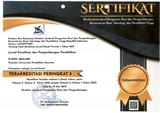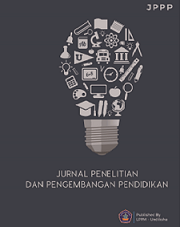Efektivitas Model Discovery Learning dan Model Contextual Teaching and Learning terhadap Kemampuan Berpikir Tingkat Tinggi Siswa
DOI:
https://doi.org/10.23887/jppp.v6i3.51459Keywords:
Efektivitas, Discovery Learning, Higher Order Thingking SkillAbstract
Salah satu upaya pengelolaan dalam bidang pendidikan yang dapat dilakukan untuk mencetak SDM yang berkualitas yaitu dengan membiasakan membentuk budaya berpikir tingkat tinggi pada siswa dalam proses pembelajarannya. Penelitian ini bertujuan untuk menganalisis perbandingan tingkat keefektifan model discovery learning dan model contextual teaching and learning terhadap kemampuan berpikir tingkat tinggi peserta didik. Metode penelitian ini adalah eksperimen semu (quasi exsperimental). Desain penelitian yang digunakan adalah postest only with Non-Equivalent Control Group Design. Instrumen pengumpulan data menggunakan tes tertulis berbentuk essay. Analisis data yang digunakan yakni uji t-test. Hasil penelitian pada kelas yang menerapkan model discovery learning menunjukkan bahwa kemampuan berpikir tingkat tinggi sebelum perlakuan menunjukkan rata-rata nilai sebesar 28,17 dan setelah perlakuan menunjukkan rata-rata nilai sebesar 84,34. Hal ini menujukkan bahwa adanya perbedaan antara kemampuan berpikir tingkat tinggi sebelum dan sesudah perlakuan atau dapat dikatakan bahwa ada peningkatan kemampuan berpikir tingkat tinggi setelah diterapkan model discovery learning. Pada kelas yang menerapkan model contextual teaching and learning menunjukkan adanya perbedaan kemampuan berpikir tingkat tinggi pada saat sebelum perlakuan yang menunjukkan rata-rata nilai sebesar 22,06 dan setelah perlakuan menunjukkan rata-rata nilai sebesar 73,35 sehingga dapat dikatakan bahwa ada peningkatan kemampuan berpikir tingkat tinggi setelah diterapkan model contextual teaching and learning. Berdasarkan kedua fakta tersebut dapat disimpulkan bahwa kedua model pembelajaran ini efektif.
References
Al Hakim, M. F., Sariyatun, S., & Sudiyanto, S. (2018). Constructing students critical thinking skill through discovery learning model and contextual teaching and learning model as solution of problems in learning history. International Journal of Multicultural and Multireligious Understanding, 5(4), 175–183. https://doi.org/10.18415/ijmmu.v5i4.240. DOI: https://doi.org/10.18415/ijmmu.v5i4.240
Andini, S. R., Putri, V. M., Devi, M. Y., & Erita, Y. (2021). Mendesain Pembelajaran PKn dan IPS yang Inovatif dan Kreatif dengan Menggunakan Model Pembelajaran Pada Tingkat Sekolah Dasar. Jurnal Basicedu, 5(6), 5671–5681. https://doi.org/10.31004/basicedu.v5i6.1760. DOI: https://doi.org/10.31004/basicedu.v5i6.1760
Anugraheni, A. D., Oetomo, D., & Santosa, S. (2018). Pengaruh Model Discovery Learning dengan Pendekatan Contextual Teaching Learning terhadap Keterampilan Argumentasi Tertulis Siswa ditinjau dari Kemampuan Akademik. Bioedukasi: Jurnal Pendidikan Biologi, 11(2), 123–128. https://doi.org/10.20961/bioedukasi-uns.v11i2.24914.
Bizimana, E., Mutangana, D., & Mwesigye, A. (2021). Performance analysis of biology education under the implementation of lower secondary school biology-competence-based curriculum: Policy implications. Interdisciplinary Journal of Environmental and Science Education, 18(1). https://doi.org/10.21601/ijese/11331. DOI: https://doi.org/10.21601/ijese/11331
Blikstein, P., Worsley, M., Piech, C., Sahami, M., Cooper, S., & Koller, D. (2014). Programming pluralism: Using learning analytics to detect patterns in the learning of computer programming. Journal of the Learning Sciences, 23(4), 561–599. https://doi.org/10.1080/10508406.2014.954750. DOI: https://doi.org/10.1080/10508406.2014.954750
Fischer, C., Fishman, B., Dede, C., Eisenkraft, A., Frumin, K., Foster, B., & McCoy, A. (2018). Investigating relationships between school context, teacher professional development, teaching practices, and student achievement in response to a nationwide science reform. Teaching and Teacher Education, 72, 107–121. https://doi.org/10.1016/j.tate.2018.02.011. DOI: https://doi.org/10.1016/j.tate.2018.02.011
Gilboy, M. B., Heinerichs, S., & Pazzaglia, G. (2015). Enhancing student engagement using the flipped classroom. Journal of Nutrition Education and Behavior, 47(1), 109–114. https://doi.org/10.1016/j.jneb.2014.08.008. DOI: https://doi.org/10.1016/j.jneb.2014.08.008
Haeruman, L. D., Rahayu, W., & Ambarwati, L. (2017). Pengaruh model discovery learning terhadap peningkatan kemampuan berpikir kritis matematis dan self-confidence ditinjau dari kemampuan awal matematis siswa SMA di Bogor Timur. JPPM (Jurnal Penelitian Dan Pembelajaran Matematika), 10(2). https://doi.org/10.30870/jppm.v10i2.2040. DOI: https://doi.org/10.30870/jppm.v10i2.2040
Hakim, M. W., & Sari, D. M. M. (2022). Practicing Contextual Teaching and Learning Approach to Enhance Students’ Higher Order Thinking Skill on Writing Ability. Elsya: Journal of English Language Studies, 4(3), 298–308. https://doi.org/10.31849/elsya.v4i3.11541. DOI: https://doi.org/10.31849/elsya.v4i3.11541
Haryadi, R., & Pujiastuti, H. (2019). Discovery Learning based on Natural Phenomena to Improve Students’ Science Process Skills. Jurnal Penelitian & Pengembangan Pendidikan Fisika, 5(2), 183–192. https://doi.org/10.21009/1.05214. DOI: https://doi.org/10.21009/1.05214
Haryati, T. (2022). Meta-Sintesis: Pembelajaran Matematika Berbantuan Geogebra Untuk Meningkatkan Kemampuan Hots. Jurnal Dimensi Matematika, 5(2), 444–458. https://doi.org/10.33059/jdm.v5i02.6750.
Hasanah, N. (2015). Dampak kompetensi profesional guru dalam meningkatkan mutu pendidikan madrasah ibtidaiyah di kota Salatiga. INFERENSI: Jurnal Penelitian Sosial Keagamaan, 9(2), 445–466. https://doi.org/10.18326/infsl3.v9i2.445-466. DOI: https://doi.org/10.18326/infsl3.v9i2.445-466
Hasibuan, M. I. (2014). Model Pembelajaran CTL (Contextual Teaching and Learning). Logaritma: Jurnal Ilmu-Ilmu Pendidikan Dan Sains, 2(1). https://doi.org/10.24952/logaritma.v2i01.214.
Hidayat, M. S. (2012). Pendekatan Kontekstual Dalam Pembelajaran. INSANIA: Jurnal Pemikiran Alternatif Kependidikan, 17(2). https://doi.org/10.24090/insania.v17i2.1500.
Izzah, K. H., & Azizah, M. (2019). Analisis kemampuan penalaran siswa dalam pemecahan masalah matematika siswa kelas IV. Indonesian Journal of Educational Research and Review, 2(2), 210–218. https://doi.org/10.23887/ijerr.v2i2.17629. DOI: https://doi.org/10.23887/ijerr.v2i2.17629
Kurniati, K., Kusumah, Y. S., Sabandar, J., & Herman, T. (2015). Mathematical critical thinking ability through contextual teaching and learning approach. Journal on Mathematics Education, 6(1), 53–62. https://doi.org/10.22342/jme.61.53. DOI: https://doi.org/10.22342/jme.6.1.1901.53-62
Lu, K., Pang, F., & Shadiev, R. (2021). Understanding the mediating effect of learning approach between learning factors and higher order thinking skills in collaborative inquiry-based learning. Educational Technology Research and Development, 69(5), 2475–2492. https://doi.org/10.1007/s11423-021-10025-4. DOI: https://doi.org/10.1007/s11423-021-10025-4
Magdalena, I., Aj, A. H., Auliya, D., & Ariani, R. (2020). Analisis Kemampuan Berpikir Kritis Siswa Kelas VI dalam Pembelajaran IPA di SDN Cipete 2. PENSA, 2(1), 153–162. https://doi.org/10.36088/pensa.v2i1.848.
Meriyana, R., Suprapto, P. K., & Hernawati, D. (2020). Efektivitas Model Discovery Learning Terhadap Kemampuan Berpikir Kritis Peserta Didik Pada Sub Konsep Bryophyta Dan Pteridophyta Di Kelas X Sma It Riyadlussholihin Sukaratu. Jurnal Metaedukasi: Jurnal Ilmiah Pendidikan, 2(2), 64–78. https://doi.org/10.37058/metaedukasi.v2i2.2512. DOI: https://doi.org/10.37058/metaedukasi.v2i2.2512
Muhali, M., Yuanita, L., & Ibrahim, M. (2019). The Validity and Effectiveness of the Reflective-Metacognitive Learning Model to Improve Studentsâ€TM Metacognition Ability in Indonesia. Malaysian Journal of Learning and Instruction, 16(2), 33–74. https://doi.org/10.32890/mjli2019.16.2.2. DOI: https://doi.org/10.32890/mjli2019.16.2.2
Prasetya, A. E. (2022). Desain Pembelajaran Berbasis Discovery Learning untuk Meningkatkan Self Efficacy Siswa Sekolah Dasar. JURNAL SYNTAX IMPERATIF: Jurnal Ilmu Sosial Dan Pendidikan, 3(3), 218–227. https://doi.org/10.36418/syntax-imperatif.v3i3.170. DOI: https://doi.org/10.36418/syntax-imperatif.v3i3.170
Purwaningsih, E., Sari, S. P., Sari, A. M., & Suryadi, A. (2020). The Effect of STEM-PjBL and Discovery Learning on Improving Students’ Problem-Solving Skills of Impulse and Momentum Topic. Jurnal Pendidikan IPA Indonesia, 9(4), 465–476. https://doi.org/10.15294/jpii.v9i4.26432. DOI: https://doi.org/10.15294/jpii.v9i4.26432
Putra, I. D. G. W., Agung, A. A. G., & Parmiti, D. P. (2017). Pengaruh Model Pembelajaran Discovery Learning Berbasis Lingkungan Terhadap Hasil Belajar IPA Pada Siswa Kelas V Semester Genap Tahun Pelajaran 2016/2017 di SD Gugus II Kecamatan Tampaksiring. Mimbar PGSD Undiksha, 5(2). https://doi.org/10.23887/jjpgsd.v5i2.10712.
Putri, H. E., Rahayu, P., Saptini, R. D., & Misnarti, M. (2016). Keterkaitan penerapan pendekatan CPA dan peningkatan kemampuan koneksi matematis siswa sekolah dasar. Metodik Didaktik: Jurnal Pendidikan Ke-SD-An, 11(1). https://doi.org/10.17509/md.v11i1.3785.
Radianti, J., Majchrzak, T. A., Fromm, J., & Wohlgenannt, I. (2020). A systematic review of immersive virtual reality applications for higher education: Design elements, lessons learned, and research agenda. Computers & Education, 147, 103778. https://doi.org/10.1016/j.compedu.2019.103778. DOI: https://doi.org/10.1016/j.compedu.2019.103778
Renwick, D. W., Redman, T., & Maguire, S. (2013). Green human resource management: A review and research agenda. International Journal of Management Reviews, 15(1), 1–14. https://doi.org/10.1111/j.1468-2370.2011.00328.x. DOI: https://doi.org/10.1111/j.1468-2370.2011.00328.x
Rubiyanto, B. A. J., Marjono, M., & Prayitno, B. A. (2016). Penerapan Model Discovery Learning Pada Materi Ekosistem Untuk Meningkatkan Kemampuan Berpikir Tingkat Tinggi Siswa Kelas X SMA. BIO-PEDAGOGI, 5(1), 6–14. https://doi.org/10.20961/bio-pedagogi.v5i1.5394. DOI: https://doi.org/10.20961/bio-pedagogi.v5i1.5394
Sari, M., Habibi, M., & Putri, R. (2018). Pengaruh model pembelajaran kooperatif tipe think-pairs-share dalam pembelajaran matematika terhadap kemampuan pemahaman konsep matematis dan pengembangan karakter siswa sma kota sungai penuh. Edumatika: Jurnal Riset Pendidikan Matematika, 1(1), 7–21. https://doi.org/10.32939/ejrpm.v1i1.221. DOI: https://doi.org/10.32939/ejrpm.v1i1.221
Sunarsih, S., Rahayuningsih, M., & Setiati, N. (2020). The Development of Biodiversity Module Using Discovery Learning Based on Local Potential of Wonosobo. Journal of Innovative Science Education, 9(1), 1–11. https://doi.org/10.15294/JISE.V8I1.31178.
Surya, Y. F. (2017). Penerapan model pembelajaran problem based learning untuk meningkatkan hasil belajar matematika siswa kelas IV SDN 016 Langgini Kabupaten Kampar. Jurnal Cendekia: Jurnal Pendidikan Matematika, 1(1), 38–53. https://doi.org/10.31004/cendekia.v1i1.7. DOI: https://doi.org/10.31004/basicedu.v1i1.150
Tari, D. K., & Rosana, D. (2019). Contextual teaching and learning to develop critical thinking and practical skills. Journal of Physics: Conference Series, 012102. DOI: https://doi.org/10.1088/1742-6596/1233/1/012102
Downloads
Published
How to Cite
Issue
Section
License
Copyright (c) 2022 Kurniasi Paputungan, Hartono Mamu, Abubakar Sidik Katili

This work is licensed under a Creative Commons Attribution-ShareAlike 4.0 International License.
Authors who publish with the Jurnal Penelitian dan Pengembangan Pendidikan agree to the following terms:
- Authors retain copyright and grant the journal the right of first publication with the work simultaneously licensed under a Creative Commons Attribution License (CC BY-SA 4.0) that allows others to share the work with an acknowledgment of the work's authorship and initial publication in this journal.
- Authors are able to enter into separate, additional contractual arrangements for the non-exclusive distribution of the journal's published version of the work (e.g., post it to an institutional repository or publish it in a book), with an acknowledgment of its initial publication in this journal.
- Authors are permitted and encouraged to post their work online (e.g., in institutional repositories or on their website) prior to and during the submission process, as it can lead to productive exchanges, as well as earlier and greater citation of published work. (See The Effect of Open Access)







